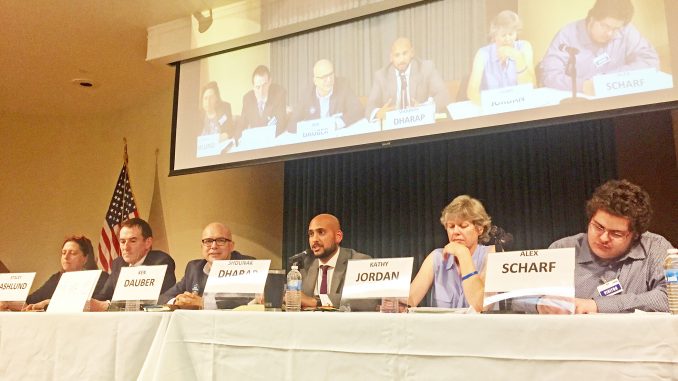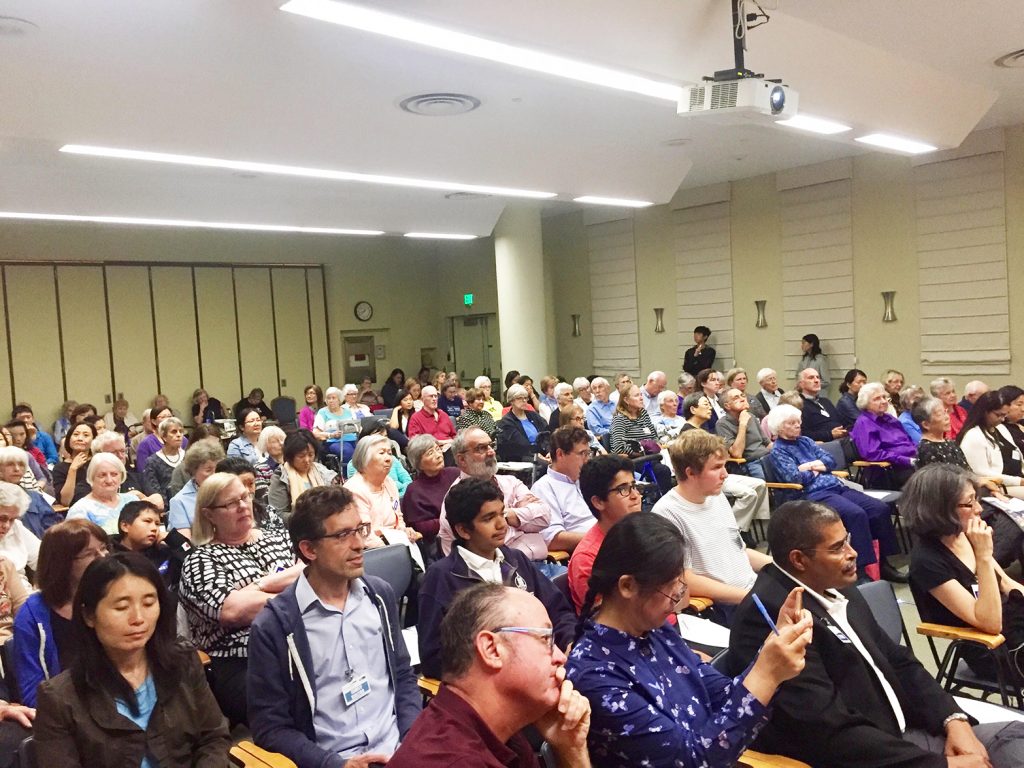
BY ALLISON LEVITSKY
Daily Post Staff Writer
All six Palo Alto school board candidates invoked a spirit of inclusivity last night (Oct. 5) at a forum targeting a group of voters who have at times felt left out of district decision-making: Asian-Americans, who comprise 34.8% of the district.
Asian Americans for Community Involvement and the Palo Alto Chinese Parents Club co-hosted the event at Channing House, a retirement community on Webster Street. Councilwoman Lydia Kou helped to moderate the debate.
One questioner asked the candidates if they see any major issues with the district’s changing demographics, including new immigrants and a growing Asian community, and how they would advocate to ensure these new students’ smooth adjustment academically and socially.
“We are all immigrants here in this country. We just came at different times. As such, we all have a right to be here and a right to be heard,” Palo Alto High School parent and district critic Kathy Jordan said, noting that 10 years ago, she learned that two-thirds of her daughter’s class had at least one foreign-born parent.
Achievement gap
The district grapples with an achievement gap with Asian and white students outperforming their Latino and black classmates. Jordan noted that while many students in the district are high achievers, more than 30% of Palo Alto students graduate without passing the classes that make them eligible for admission to a UC or CSU.
Alex Scharf, a 21-year-old Paly graduate, noted what he sees as a shortfall of the district’s high-performing academics, which attract newcomers to Palo Alto.

“We will miss out on other minorities that aren’t necessarily getting as much attention, that aren’t high-achieving,” Scharf said. “We need to balance both the people coming here for a good education and a high-achieving education versus the people here who need the support and don’t necessarily have access to that.”
Christopher Boyd, a parent who says he runs an after-school STEM program called InstED, said he wants to reduce class sizes to make it easier for kids moving into the district to integrate and make friends.
School board President Ken Dauber touted his work with Asian Americans for Community Involvement to better incorporate parents from different cultural backgrounds to discuss educational issues and find areas of common ground.
Special education advocate Stacey Ashlund said she wanted to ensure better representation on the school board, which is currently all white, and on board committees.
The only nonwhite candidate in next month’s race is Shounak Dharap, a 28-year-old litigator and Gunn High School graduate whose parents are Indian immigrants. Dharap was the first to answer one of the most explosive issues in the district from the past year: the renaming of Jordan and Terman middle schools to Greene and Fletcher.
Yamamoto controversy
Dozens of largely Chinese-American parents were incensed when the district nearly named one of the schools after Fred Yamamoto, a Paly graduate who was held in Japanese internment camps, then died in World War II fighting for the U.S. The Yamamoto name offended parents because they said they associate it with Isoroku Yamamoto, the Japanese admiral who masterminded Pearl Harbor. A number of Chinese parents last spring compared it to naming a school after a person who shared Adolf Hitler’s last name and said that if they had had representation on a committee that chose the new school names, Yamamoto would never have been put forward.
“Real easy question, huh?” Dharap grinned when he was asked for his views on the Yamamoto issue first. Dharap said he thought there was a breakdown in the process and that the board should have ensured the committee, which also had no Latino members, represented the diversity in the district.
Jordan noted that not everyone can serve on a committee, but that the district should have found other ways to involve more parents.
Scharf said he would have named the schools after natural features in order to limit conflict, an idea that Dauber supported. Ashlund said the board will keep more parents in the know if it keeps discussing issues at two meetings before voting — a practice Dauber wants to do away with as a time waster — and welcome input on future issues by email.
Boyd said the clumsy renaming process called attention to how “insensitive we are at any given moment in time” and that he was glad the district changed the names.
Confucianism
When asked about his views on the district’s sex education policies, Boyd mentioned Confucianism in saying that the district should defer to parents’ wishes in what their children are taught about sex.
“We cannot let bureaucracies take over our lives and dictate what values we’re allowed to have for our children,” Boyd said. “In this sense, we really have to realize the number of times in which values that are very important to different religions, to different ethnic groups, get trampled.”
All six candidates expressed support for introducing an ethnic studies curriculum. Ashlund said she wanted to see more community connectedness generally and that community service helps students to be happier, healthier and more successful academically.
Ashlund also lamented that curricula in women’s studies and social justice are not currently offered at Gunn High School because of low enrollment.
Boyd said he wanted to start ethnic studies in pre-kindergarten and that it was too long to wait until middle and high school to offer those classes. “As students get older, as they grow up, there is a way for the racial component to not even be a factor,” Boyd said. “What we’re really talking about is cultural sharing.”
Dauber said he thinks there is more hostility toward immigrants in the U.S. today than at any time since the Chinese Exclusion Act of 1882. He noted that with his support, the board in January 2017 passed a resolution telling school employees not to cooperate with immigration enforcement action at school.




“Dauber. . . noted that with his support, the board in January 2017 passed a resolution telling school employees not to cooperate with immigration enforcement action at school.”
Darn, he almost had all 4 votes from our family. I don’t support anyone who doesn’t cooperate with the government. It means they think they are above the law, no integrity.
As I said at the forum, the resolution the board passed in January 2017 instructed school site employees to contact the Superintendent’s office for direction if federal immigration authorities come to one of our schools — rather than simply cooperating in an immigration enforcement action without necessarily understanding what the law requires. I voted for the resolution because it’s critical that all district families feel safe sending their children to school, within the limits of the law. There is a potential, in fact, for various federal and state laws to be in conflict in a particular situation, which may require district staff to seek legal advice about how to proceed. District staff will follow the law in this area as in all others.